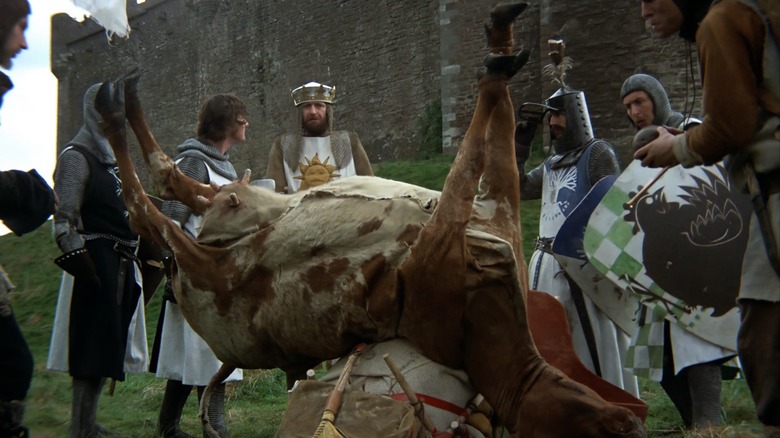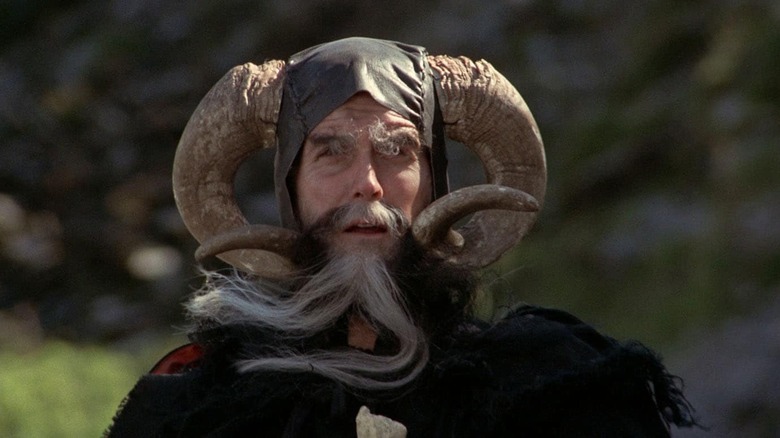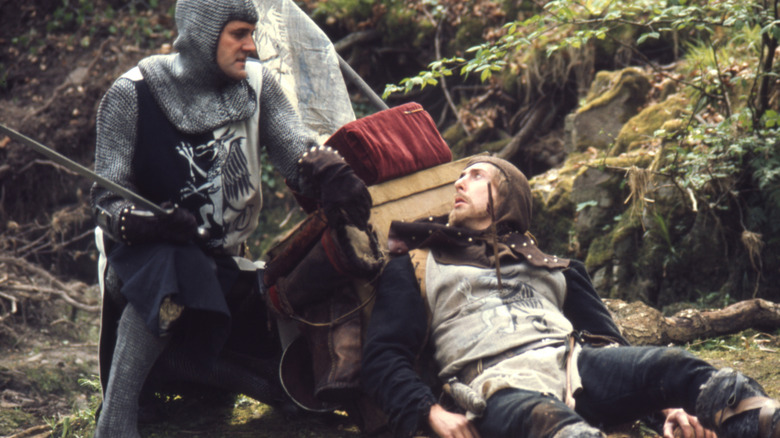Monty Python And The Holy Grail's Success In America Was All About Timing
When the seminal British TV program "Monty Python's Flying Circus" was still on the air (1969 – 1974), it wasn't yet reaching a massive international audience. To facilitate the show's spread, a feature film consisting of re-staged sketches from the show's first two seasons — called "And Now for Something Completely Different" — was released in England in 1971. That film is certainly funny, although it lacks the comedic magic of the TV show.
"Monty Python and the Holy Grail" was put into production after "Flying Circus" went off the air. The special features for the film's 2001 DVD release featured vintage footage of late cast member Graham Chapman explaining that the troupe had been working on a script — pointedly absurd, natch — that was set partially in the Middle Ages and partially in the present day. After some discussion, the Pythons came up with the King Arthur/Holy Grail angle, knowing that he would certainly not find the sacred object by the end.
"Holy Grail" was released in England on April 3, 1975, and came stateside on the 27 of that same month. On a minuscule $400,000 budget, it would make about $1.8 million in the United States. Thanks to generations of repertory screenings, it has likely made millions upon millions more.
In a 2017 interview with The Morning Call, Python John Cleese recalls that "Holy Grail" took the U.S. by storm thanks to a fortunate piece of timing. As it turned out, "Flying Circus" had just begun airing on PBS when "Holy Grail" was in theaters. Those interested in this new, kooky TV show already had a movie they could tie in with it. Accidental synergy at its finest.
A precipitant panoply of Python paraphernalia
In America, 1974 and 1975 were a hugely significant time for Monty Python. Although their show had gone off the air in England, it was just growing a cult in the U.S. thanks to the PBS broadcast. Public TV nerds suddenly had a refreshing new taste of what has often been called one of the best TV shows of all time, and a lot of American comedy vernacular began to change; it's certainly no coincidence that certain North American sketch comedy shows of the 1990s ("The State," "Kids in the Hall," etc.) exhibited a similarly Pythonesque, absurdist bent, as they were founded by people who watched the show in the '70s. Python was taking off in North America, and interest in the show led to a 1974 re-release of "And Now for Something Completely Different."
Cleese recalls the explosion quite well, and was thrilled to see the good timing between the one-two-three punch of "Flying Circus," "Completely Different," and "Holy Grail" land all at the dame time.
"Then what happened: It opened in America, and to our extraordinary good luck, it opened just after the television series had come on PBS. And if it had opened six months before that, it probably wouldn't have opened at all. Because it opened just after the PBS series, it did very, very good business. And, for the first time in my life, at the age of about 34, it felt as though people were climbing up my ladders outside my bedroom window and throwing money in, you know?"
But ... why?
So American audiences had a 16-ton weight of Python dropped on their heads. The sudden influx certainly pleased nascent fans, and they were kind of spoiled by years of TV and movies to enjoy all at once. But while sheer volume certainly contributed to the success of "Holy Grail" in the United States, audiences were — first and foremost — responding to the Pythons' own brand of unusual comedy. "Holy Grail" had a tie-in TV show, but audiences also found the flick to be funny. When Cleese was asked the rather broad question as to why audiences linked up with the film as intensely as they did, he was at a bit of a loss. Cleese said:
"I don't know. I think it was a lot of it is very funny. Particularly the first half. I think there were a lot of good jokes there. It doesn't really require much knowledge of the period; You kind of get the idea easily. And it was funny and fresh and silly, and really not very much like anything else. It wasn't Marx Brothers, you know? It wasn't Laurel and Hardy. It was recognizably comedy, but it just appealed to people because think it was something very original about it."
On Python's originality, the late Terry Jones, in the 1998 special "Monty Python Live at Aspen," pointed out that the troupe gave themselves a mandate to be as indefinable as possible. Their show had to be unexpected. Jones lamented, however, that the word "Pythonesque" appears in the Oxford English Dictionary, pointing out how badly the troupe failed in that regard. "Holy Grail," luckily — unexpected or not — still possesses every ounce of its comedic power.
Spam, Raymond Luxury Yacht, The Bishop!, No Bananas on Algon, Clodagh Rodgers, etc. etc.


